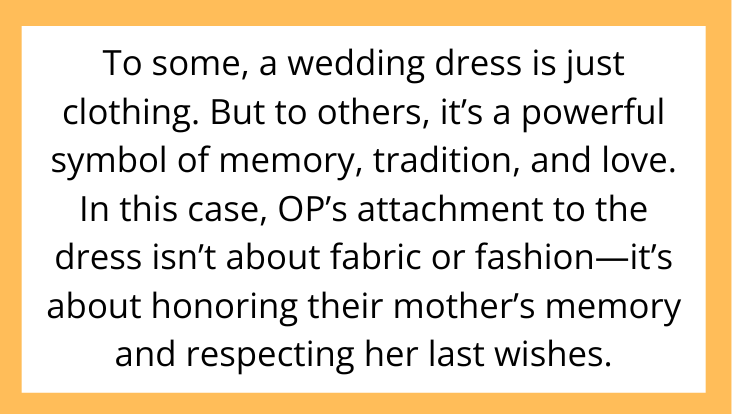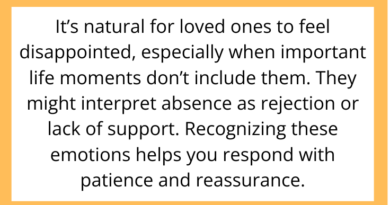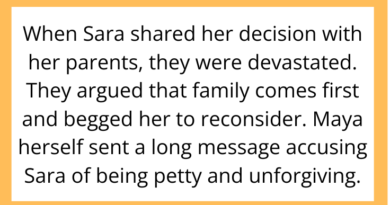AITAH for Not Letting My Brother’s Fiancée Wear My Late Mother’s Wedding Dress?
Weddings are deeply emotional events, often intertwined with family traditions and heirlooms. But what happens when someone asks to borrow an item that holds profound sentimental value—one you’re not ready to part with? That’s exactly the dilemma one Reddit user faced when they refused to let their brother’s fiancée wear their late mother’s wedding dress.
The post quickly gained traction on r/AITAH, sparking debate about grief, boundaries, and entitlement. Let’s take a closer look at this situation, break down the arguments on both sides, and explore how to navigate complex family expectations with empathy and clarity.
The Situation: A Dress with Deep Personal Meaning

The original poster (OP) explained that their mother passed away several years ago. Before her death, she left her wedding dress specifically to OP, with no mention of sharing it. OP cherished the dress as a treasured keepsake and had it stored safely in their closet.
Now, OP’s brother is engaged, and his fiancée recently asked if she could wear the dress for their wedding. OP felt caught off guard and politely declined. But the reaction from their family wasn’t so polite. The brother was upset, accusing OP of being “selfish” and “cold,” while the fiancée felt rejected and disrespected. Some family members even suggested OP was letting grief cloud their judgment.
Feeling overwhelmed, OP turned to Reddit to ask the big question: AITAH for saying no?
Why the Dress Matters: Sentimental Value and Grief
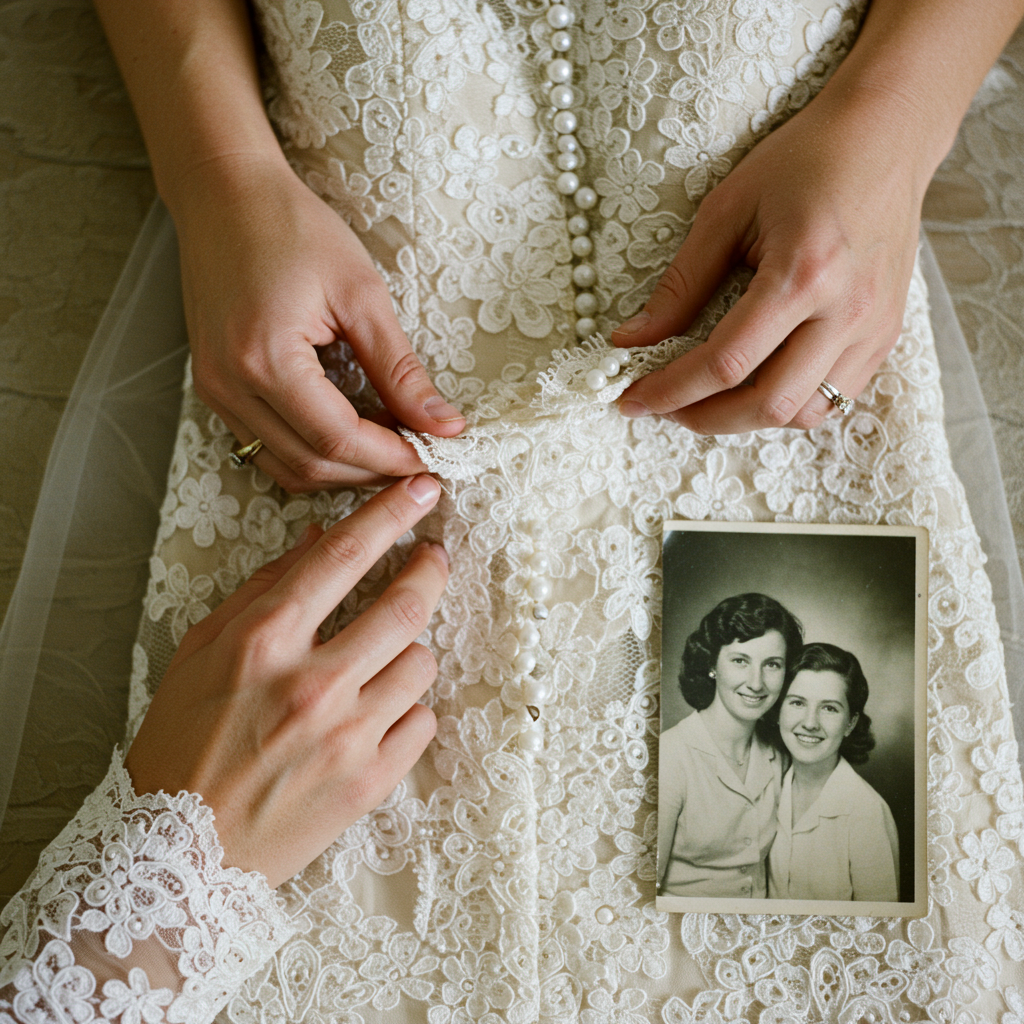
To some, a wedding dress is just clothing. But to others, it’s a powerful symbol of memory, tradition, and love. In this case, OP’s attachment to the dress isn’t about fabric or fashion—it’s about honoring their mother’s memory and respecting her last wishes.
Here’s why OP’s feelings are valid:
-
It was a direct bequest: The mother gave the dress specifically to OP, not to the family as a whole.
-
Grief is personal: OP’s connection to the dress is part of their grieving process.
-
Emotional boundaries matter: No one should be pressured to share something so meaningful if it makes them uncomfortable.
OP’s response wasn’t vindictive or petty—it was protective.
Why the Fiancée Might Feel Hurt

From the fiancée’s perspective, the request may have seemed innocent. Maybe she admired the dress, wanted to honor her future mother-in-law, or felt it would bring the family closer.
Still, intent doesn’t always equal impact.
-
A wedding is an emotional event: Tensions run high, and small rejections can feel like personal slights.
-
Misunderstood traditions: She may have assumed the dress was a “family heirloom” meant to be passed down.
-
Lack of communication: Perhaps she didn’t realize how important the dress was to OP, or that the dress had not been offered.
Her disappointment is understandable, but it doesn’t mean OP is wrong for setting a boundary.
Family Pressure and the Guilt Trap

One of the hardest parts of OP’s story is the backlash from family. Several relatives pressured OP to reconsider, arguing that sharing the dress would be a “beautiful gesture” or that OP was “making it about themselves.”
This reaction reflects a common dynamic:
-
Minimizing grief: People often expect others to “move on” faster than they’re ready.
-
Emotional blackmail: Guilt is used to manipulate someone into doing what’s more convenient for others.
-
Misplaced priorities: Celebrating a new union shouldn’t come at the cost of disrespecting someone’s grief.
Boundaries are healthy, even when they make others uncomfortable.
Setting Boundaries with Grace

So, how can someone like OP communicate their decision firmly but kindly?
Here are some strategies:
-
Be honest but respectful: “This dress is very meaningful to me, and I’m not comfortable sharing it.”
-
Offer alternatives: Suggest using a piece of the dress fabric as a handkerchief or ribbon, or invite the fiancée to see the dress privately.
-
Stand your ground: Repeat your boundary without escalating emotion or getting defensive.
-
Avoid guilt traps: You’re allowed to say no without justifying yourself endlessly.
Clarity and compassion can coexist.
What Reddit Had to Say

The Reddit community largely sided with OP. Many users emphasized that the dress was a personal gift and that no one, not even family, is entitled to someone else’s belongings. Others pointed out that sentimental items often hold emotional weight that outsiders can’t fully grasp.
Common responses included:
-
“Absolutely NTA. Your mother gave it to you—it’s not a shared family heirloom.”
-
“You’re not responsible for managing other people’s disappointment.”
-
“You can love your brother and still protect something that means a lot to you.”
Still, a few commenters did suggest that offering a compromise might help ease tensions.
Final Thoughts: You’re Not a Villain for Protecting Your Grief
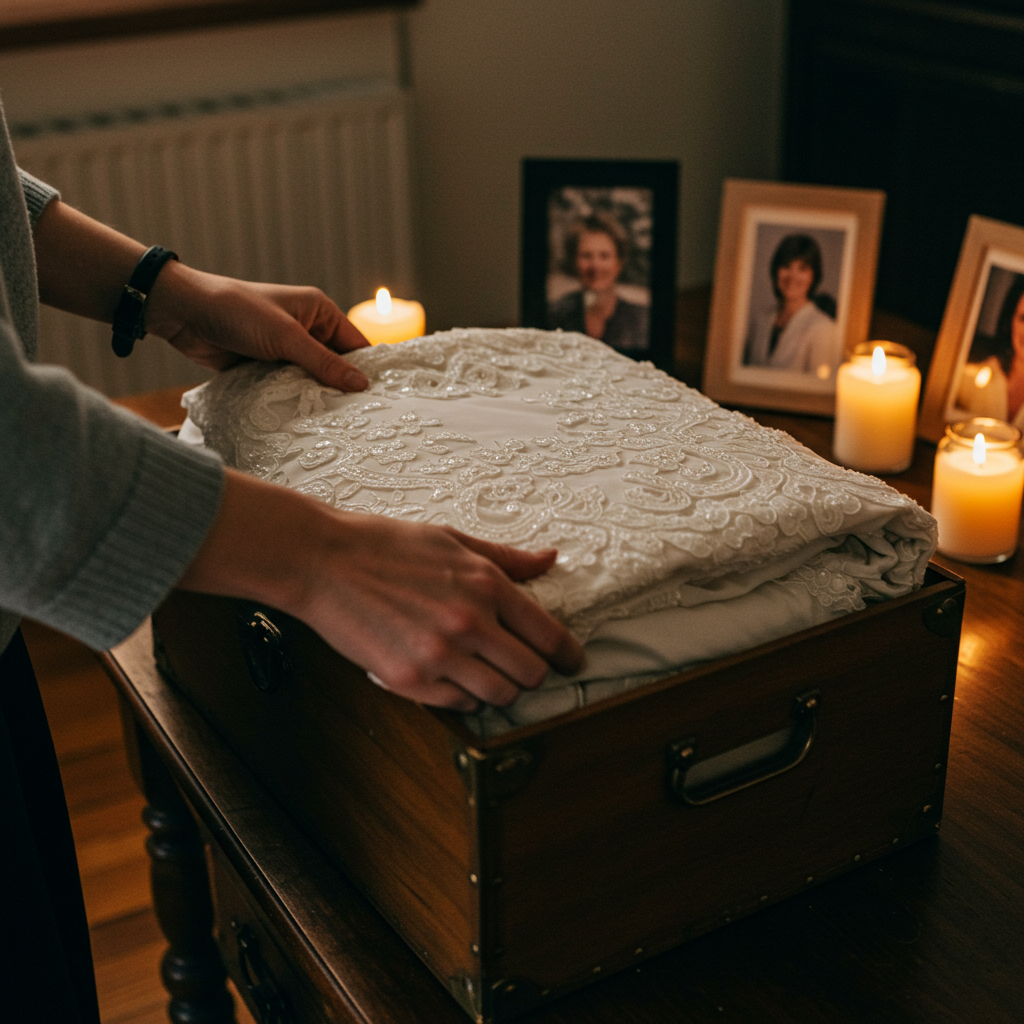
Saying no to a wedding request—especially from a loved one—can be incredibly difficult. But emotional boundaries are not selfish; they’re necessary. You can respect your family, celebrate your brother’s happiness, and still hold on to what matters most to you.
In this case, OP was right to protect their late mother’s wedding dress. The dress isn’t just a garment—it’s a piece of history, of memory, of love. And those things are worth safeguarding.
